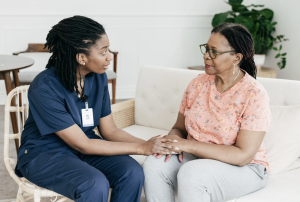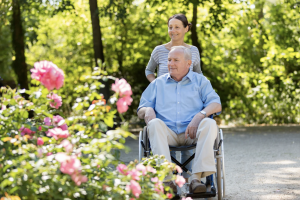Communication
Dementia affects so many areas of a loved one’s life. These areas include memory, communication, and even their personality. Because of this, conversing with a loved one with dementia is a challenging process. However, knowing a few things ahead of time can make a world of difference. Here are five tips for communicating with a loved one with dementia.
Establish A Positive Environment
First off, you have the ability to set the mood of the conversation. This is done through your tone of voice, body language, and facial expressions. Communication may be more difficult when a loved one has dementia, but they can still understand your actions. Essentially, you want everything you do and say to radiate warm, affectionate feelings to make them feel at ease.
Speak Simply & Clearly
Simple words, questions, and statements are highly important. Speaking calmly in easy to understand words and phrases will help them stay engaged. Another way to do this is to use “yes-no” questions. Basically, questions that are too open-ended can be confusing.
Be Patient
Listening closely and exercising patience will go a long way in dementia communication. Sometimes, your loved one will get stuck in the middle of a thought. When this happens, it is okay to offer support and help them find their words. Ultimately, being patient will make all the difference.
Offer Distractions When Necessary
Unfortunately, there are times when your loved one’s mood will be out of your control. If this happens, it’s important to not only be patient with your loved one but also with yourself. However, redirecting the conversation or offering healthy distractions can help if they are upset. Some effective options are offering to go for a walk or getting something to eat.
Laugh
Sometimes, the best medicine is laughter. While communication is challenging, those with dementia do often still maintain a number of social skills. Because of this, they are often happy to enjoy a sense of humor alongside you. However, always remember that laughter should never be at their expense.
Dementia Care With Compassion
At Courtyard Manor, our goal is to see a smile on your loved one’s face every day. Your family becomes our family. Our all-inclusive nursing care is on the floor 100% of the time, 24 hours a day. Visit our site today to learn more.
Reach Out To Us

How to Talk with a Parent About Moving Into Assisted Living
Guidance for Meaningful Conversations Conversations about assisted living are never easy. For many families, the topic comes up when health and daily living needs begin

Integrating Physical and Behavioral Health in Senior Living
Whole-Person Care for Seniors In senior living communities, quality care means looking beyond the immediate physical needs of residents. True wellness requires an integrated approach

Supporting Cognitive Health in Assisted Living
Daily Enrichment for Seniors As we age, maintaining cognitive health becomes just as essential as caring for our physical well-being. Cognitive decline doesn’t happen overnight—it’s





